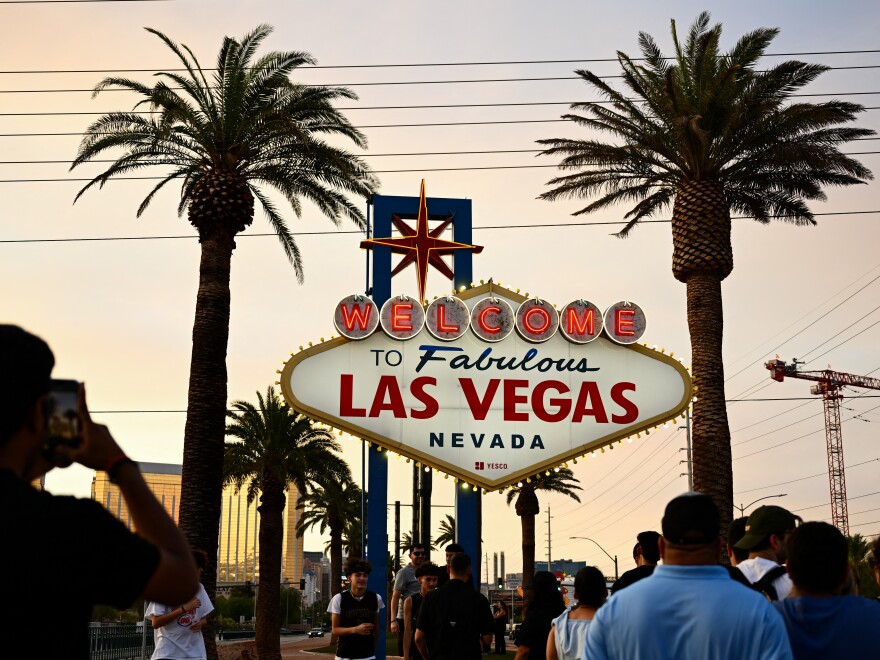Following years of growing tourism, Las Vegas appears to be cooling off, which could be a sign for the whole economy.
According to the Las Vegas Convention and tourists Authority (LVCVA), June had almost 400,000 fewer tourists, or an 11.3% reduction, than the same month last year, marking the sixth consecutive month this year that Las Vegas has seen a decline in visitors year over year.
According to Las Vegas tourism experts, June was a slower convention month than previous year, and summer is usually a slower season for Las Vegas due to its heat. However, the decline in tourism also coincides with growing worries about how President Trump’s immigration and global trade policies may affect foreign travel to the United States. In the meantime, it seems that American consumers’ buying habits are shifting due to increased costs and tariffs.
According to the LVCVA’s June report, the decline in tourism was caused by a “broader backdrop of persistent economic uncertainty and weaker consumer confidence.”
According to Andrew Woods, director of the Center for Business and Economic Research at the University of Nevada, Las Vegas, events in Las Vegas are significant nationally because they frequently mirror broader trends.
“It tends to be a signal for potentially where the economy’s headed,” he stated.
By the numbers
According to the LVCVA, Las Vegas’ convention attendance and hotel occupancy rate both decreased by a number of percentage points in June compared to the same time previous year.
Due to declines in both domestic and international travel, the city’s Harry Reid International Airport also reported a drop in passengers of over 318,000 in June over the same month the previous year.
According to the Las Vegas Review-Journal, traffic on Interstate 15 near the California-Nevada border decreased by 4.3% in June.
According to the LVCVA, conference attendance is higher this year than it was in the first half of 2024, and nearly 3.1 million visitors visited Las Vegas in June despite the slowdown. According to the Nevada Gaming Control Board, gambling revenue from the city’s casinos climbed marginally from June 2024.
International tourism takes a toll
The loss of Canadian tourists, who account for the largest portion of Las Vegas’ foreign market, has been one of the biggest setbacks, Woods said.
“A lot of the slowdown we’ve seen in international travel is, from what I understand, primarily driven by the Canadian visitations,” he stated.
As previously reported by NPR, many Canadians have canceled their plans to visit the United States in protest of Trump’s 35% tariff on a number of Canadian items and his repeated claims that Canada should become the 51st state in the union.
In a preliminary report released by the National Travel and Tourism Office, foreign visitors from almost every part of the world decreased in June compared to the same month last year in the U.S.
According to Rachel J.C. Fu, chair of the University of Florida’s Department of Tourism, Hospitality, and Event Management, news reports about increased airport surveillance have made some foreign visitors hesitant to enter the United States.
“Visa processing times and strict entry requirements have also been highlighted as barriers deterring potential international travelers,” she stated.
New York City, Cape Cod, and California have also experienced a decline in foreign visitors, especially from Canada. The United States is expected to lose $12.5 billion in foreign spending this year, according to a May report by the World Travel & Tourism Council.
More cautious spending
According to Woods, ongoing inflation and economic uncertainty are also contributing factors to Vegas’ decline. He continued by saying that although these problems have been around for a while, they now seem to be affecting how much people spend.
“They’re more discerning about where and how they’re traveling and where they’re spending their dollars,” Woods stated.
National surveys have also shown that sentiment. According to a May survey by Deloitte’s ConsumerSignals, more Americans than last year expect to take vacations this summer, but they will do so on a tighter budget.
According to Oliver Lovat, CEO of the Denstone Group and consultant to the casino sector, Las Vegas might not be in the cards for frugal consumers. He clarified that growing labor and food prices have resulted in the city becoming more costly.
“If you’re looking for a bargain, because of the way that Las Vegas has changed, it’s no longer a bargain destination,” he stated.
What’s in store for Las Vegas
It’s too soon to tell if the recent drop in Las Vegas is a one-time event or the start of a longer-term trend, according to economists.
One important metric to keep an eye on will be how Las Vegas and American customers spend their money after paying their bills and purchasing necessities, according to Woods.
“Individuals and households are asking how confident they are in their purchasing decisions, such as when they buy a new car or where to go on vacation,” he stated. “Because if they are confident enough to make those decisions, that is telling a lot about the health of our economy here in Las Vegas.”
In the upcoming months, Lovat is optimistic that tourism will increase. According to him, some tourists postponed their vacation to Las Vegas in anticipation of forthcoming big events, such as Formula 1 racing, the 2026 FIFA World Cup, and Paul McCartney and the Backstreet Boys concerts.
“Certainly these early summer, early year numbers are alarming but not necessarily disturbing,” he stated.
He went on to say that although tourism in Vegas has increased since the pandemic ended, this trend was not anticipated to continue indefinitely.
“I always said, the post-pandemic boom was not sustainable,” stated Lovat.
Copyright 2025 NPR






